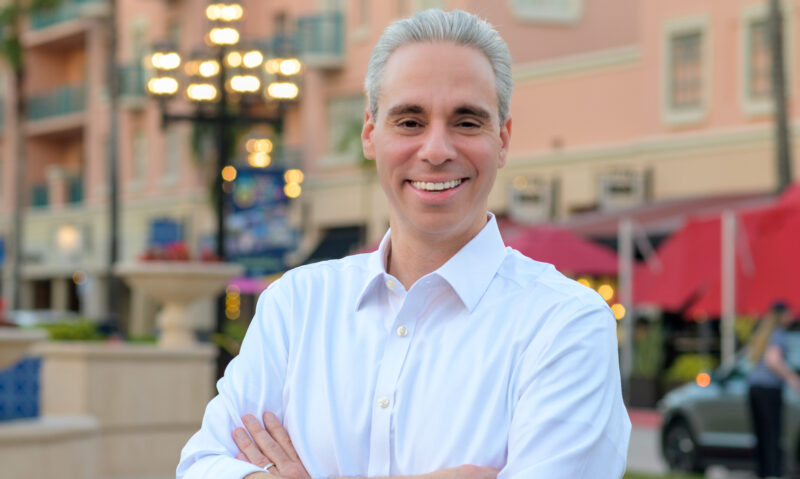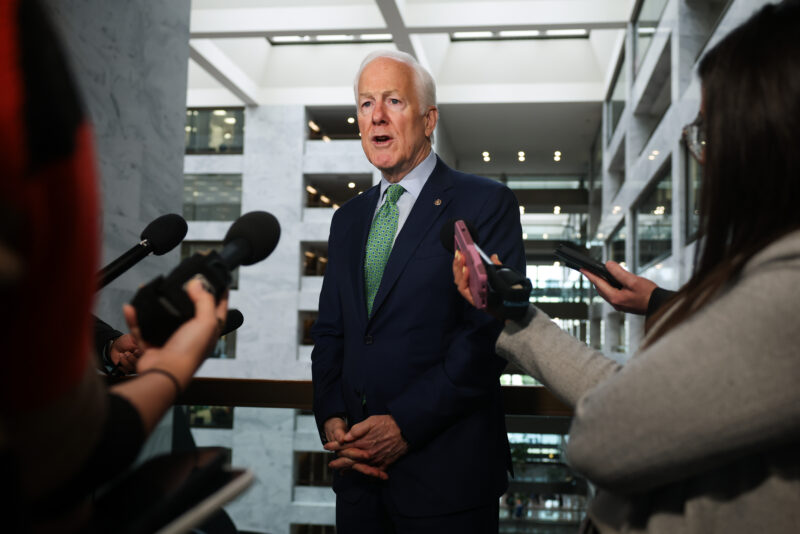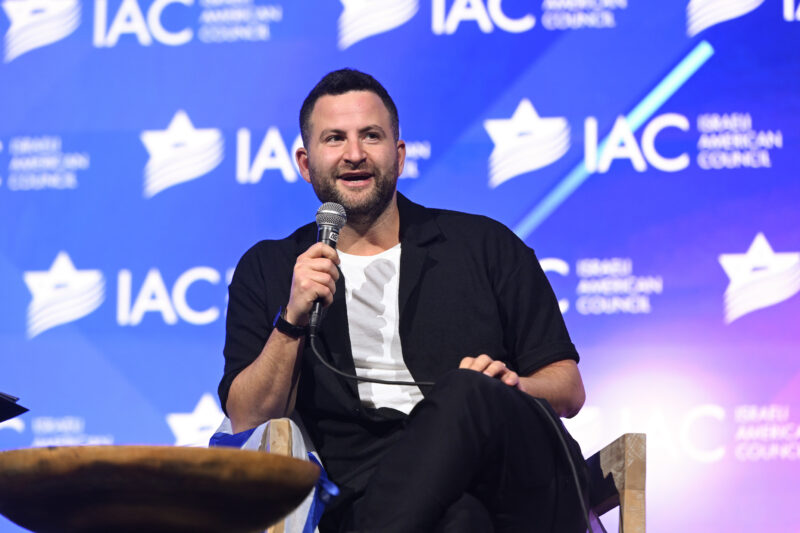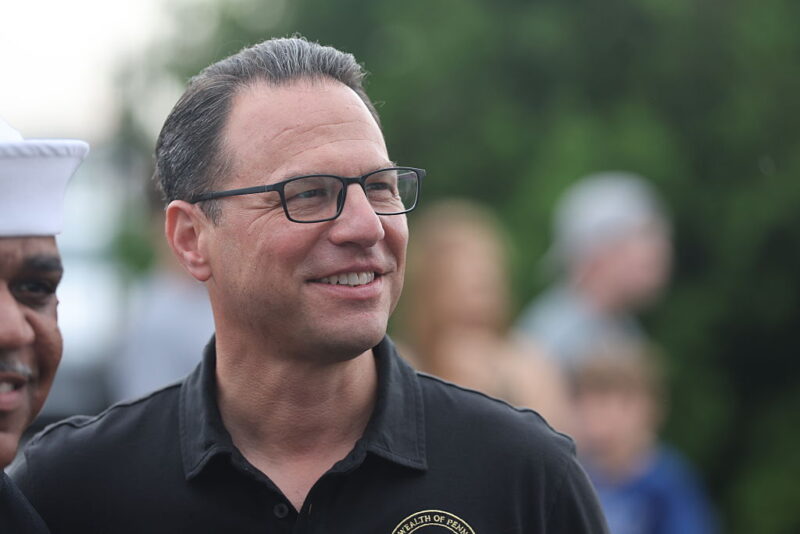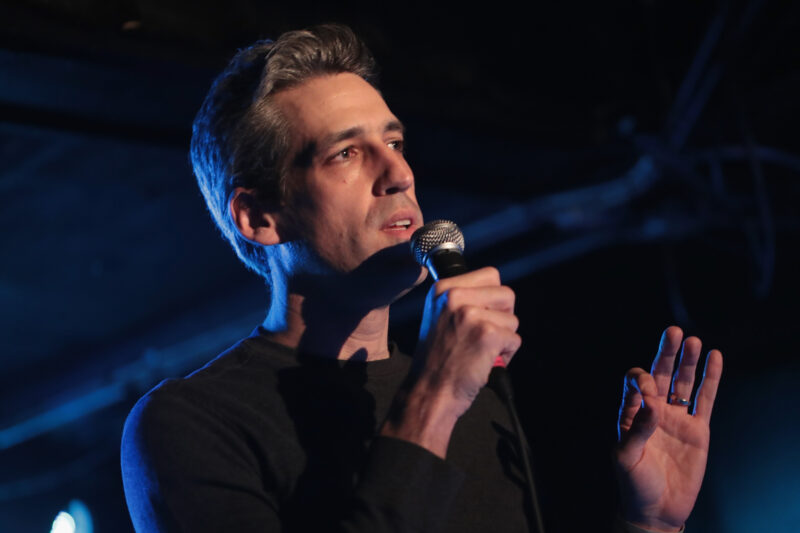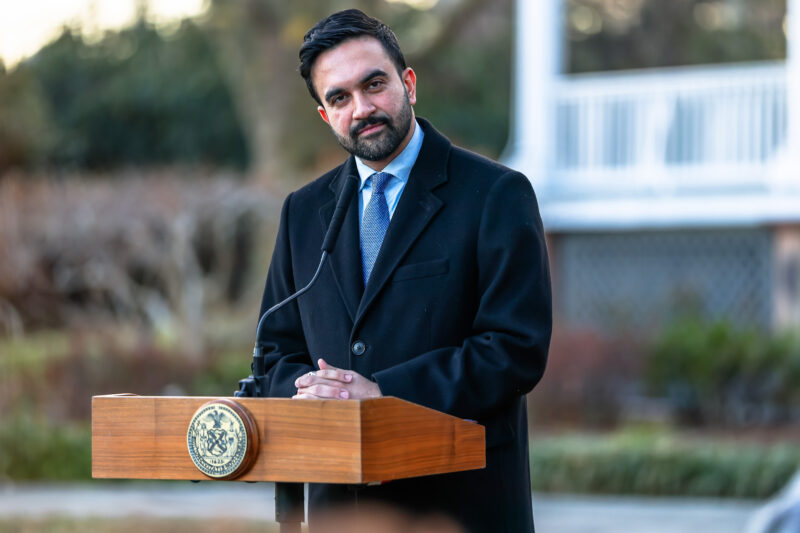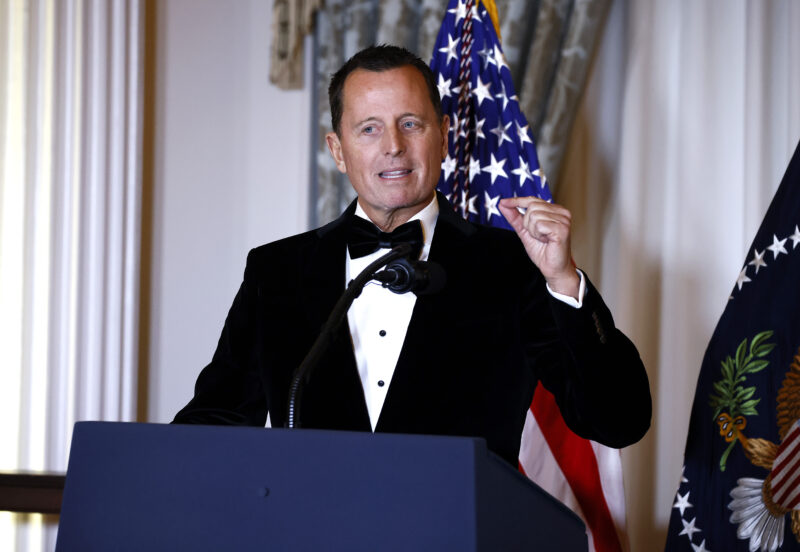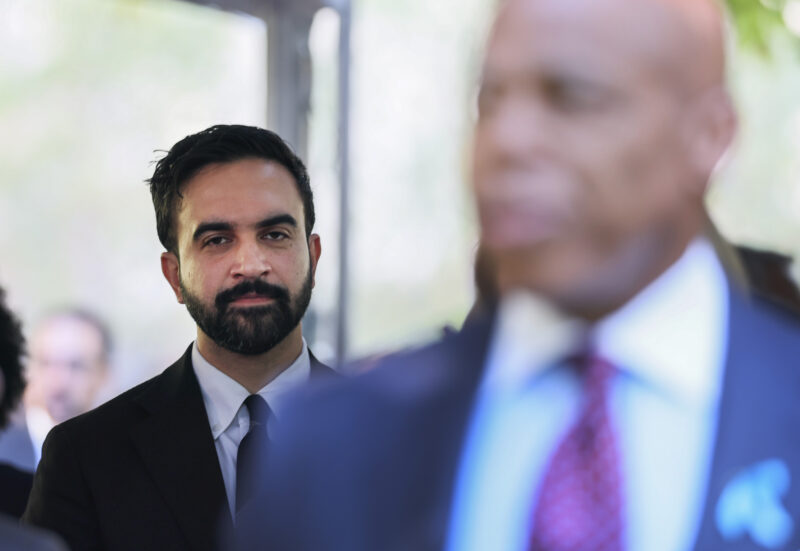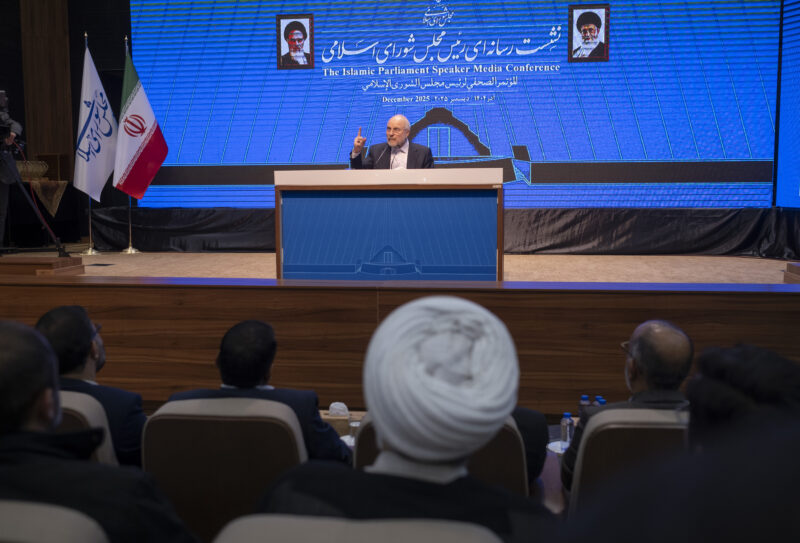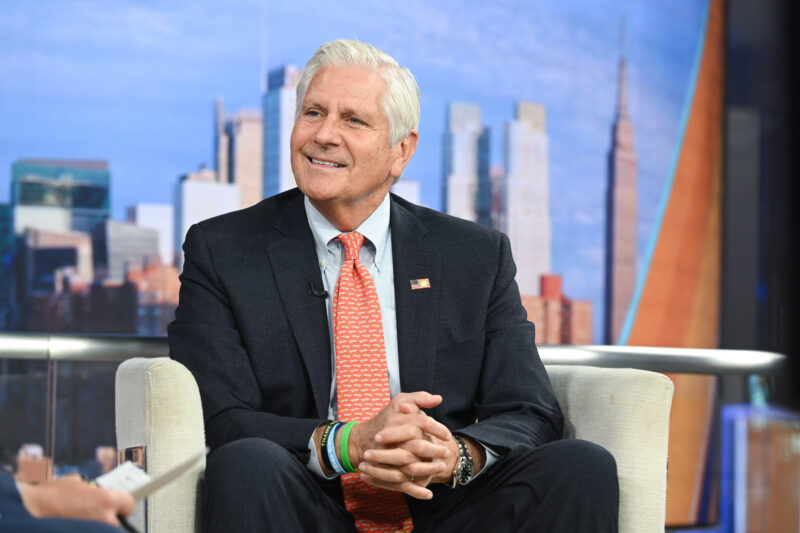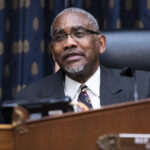Singer told JI that his alignment with the GOP has been shaped by his Jewish faith
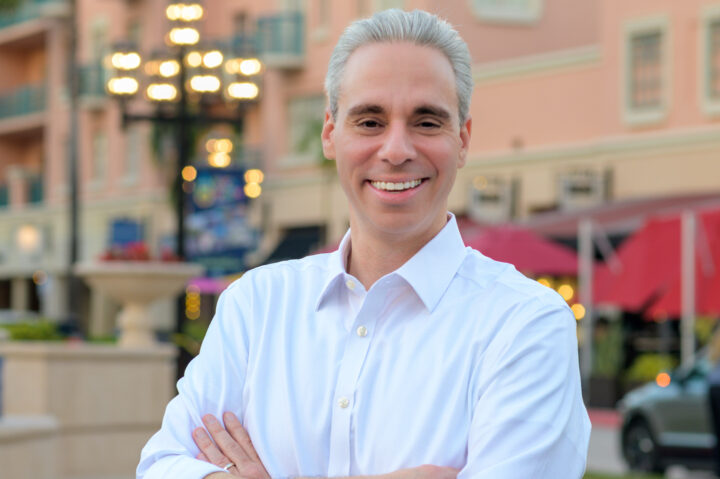
Courtesy
Boca Raton, Fla., Mayor Scott Singer
As Boca Raton, Fla., Mayor Scott Singer aims to unseat pro-Israel stalwart Rep. Jared Moskowitz (D-FL), the Republican is hoping that the region’s conservative shifts will help propel him to victory.
Singer told Jewish Insider last week he’s running for Congress because he “love[s] public service” and he sees the country at a “critical point … where we can go back to the failed policies of four years ago or continue to advance the gains that President Trump has made,” and he wants to help push Trump’s agenda forward. That includes Trump’s Middle East policy, which Singer lauded.
Singer, who is running in a traditionally Democratic district, emphasized his three-decade history of public service in the region, and said that he’s “seen a renewed enthusiasm and resurgence in terms of conservative, common sense policies,” particularly among Jewish voters, “as the Democratic Party has grown more and more left.”
“We’re seeing the Republican Party under President Trump becoming the party that really represents more of the issues that a lot of Jewish voters tend to care about,” Singer argued.
He also noted that the district, Florida’s 23rd, has seen a growth in conservative voters coming from out of state, many from states or cities led by Democrats. Trump came within two points of carrying the district in 2024, losing to former Vice President Kamala Harris, 50-48%. That was one of the bigger political shifts in the country, given that in 2020, Trump lost the district to Joe Biden by 13 points.Meanwhile, Moskowitz won his reelection bid 52%-48%.”
Whether Moskowitz and Singer actually end up facing each other in November remains somewhat of an open question, however, pending the outcome of Florida’s upcoming redistricting process.
Singer told JI that his alignment with the GOP has been shaped by his Jewish faith.
“Judaism places a value on individual rights and opportunity, responsibilities, education and freedom,” Singer said. “For hundreds of years, Jewish people were often excluded from Western society and had to make their way — often, as entrepreneurs or self employed, as generations of my family have been — finding ways for them to advance through society.”
“The promise of America is so great because anyone can come here and achieve great things,” he continued. “I’ve always leaned toward the right, because I found that this was a party that valued people’s individual opportunities, merits and contributions, and a natural home that’s consistent with the values that inform my faith.”
Singer argued that Trump has been the strongest advocate and champion of the U.S.-Israel relationship of any U.S. president and a “strong voice against antisemitism, and people are realizing this,” leading to shifts among Jewish voters toward the GOP.
He said that he “personally and spiritually [has] deep connections to the State of Israel and our ancestral home.” And he said that a continued strong U.S.-Israel relationship serves both countries’ interests.
“Israel has been taking a leading edge, fighting terror and fighting enemies who want to see the destruction of Western culture, Western values and the United States,” Singer said.
“What concerns me is in the Democratic Party — and I think it’s concerning a lot of voters, including historic Democratic voters and mainstream voters — is the outrageous and moral failings of Democratic leadership to to confront or contradict claims of genocide when Israel was brutally attacked by terrible terrorists who created committed horrific crimes against women and children — murdering, raping, strangling, kidnapping and torturing,” Singer continued, referencing the Oct. 7, 2023, Hamas terror attacks.
He downplayed anti-Israel trends among some on the right as “a few fringe commentators who seem to have lost semblance of what it means to be a conservative and do not represent the conservative movement.”
Singer emphasized that those voices are out of step with Trump.
“What concerns me is in the Democratic Party — and I think it’s concerning a lot of voters, including historic Democratic voters and mainstream voters — is the outrageous and moral failings of Democratic leadership to to confront or contradict claims of genocide when Israel was brutally attacked by terrible terrorists who created committed horrific crimes against women and children — murdering, raping, strangling, kidnapping and torturing,” Singer continued, referencing the Oct. 7, 2023, Hamas terror attacks.
Asked how he’d describe Moskowitz’s own record on these issues — the two-term Democratic lawmaker has been vocally supportive of Israel and has broken with many in his party on the issue — Singer offered little direct criticism for Moskowitz, instead arguing that he has limited power against what Singer described as a dominant anti-Israel current in the Democratic Party.
“You have to go back to the party and where you are,” Singer said. “When you’re a junior congressman and beholden to some of the increasingly hostile attitude of the Democratic Party and Democratic leadership, including statements by leaders in the House of Representatives that call Israel’s self defense a genocide. When they’re running the party, it’s very hard for any junior member to really stand out and make an effective difference in policy.”
Moskowitz responded in a statement to JI, “I guess the people who are trying to assassinate me over my support for Israel — they obviously think I’m pretty effective,” adding, “By [Singer’s] own logic, I guess there’s no reason for him to run for Congress because he won’t be able to help the district, because he’ll be a freshman.”
Moskowitz has stood apart from most Democrats on various issues relating to Israel, including voting for a controversial bill providing aid to Israel while cutting funding for the Internal Revenue Service, voting to censure Rep. Rashida Tlaib (D-MI) for anti-Israel and antisemitic rhetoric, voting to override President Joe Biden’s holds on certain arms sales to Israel and calling for stronger action by the Biden administration on a range of areas related to Israel policy, Iran and antisemitism.
The Democratic congressman has regularly crossed party lines to cosponsor legislation to support Israel and combat Iran with Republican colleagues.
Moskowitz is also facing a progressive primary challenger who has focused significantly on attacking his support for Israel.
Singer said that the U.S.’ current focus, when it comes to Israel, should be disarming and removing Hamas from Gaza. He expressed support for the Trump administration-led ceasefire plan, and said it’s “too hard to speculate” what might come after that, including whether the U.S. should support a two-state solution.
Singer said that, as a member of Congress, he would be vocal against antisemitism, and said that “Congress needs to codify gains that are coming from the Trump executive orders and reevaluate its approach to universities and other institutions at all levels of education” due to what he said was their failure to protect Jewish students’ civil rights.
“There’s still a constant and present danger to people who love freedom, the Israeli people, and also the people who’ve been oppressed by 20 years of a brutal regime,” Singer said.
He praised Trump’s “bold and necessary action” to strike Iran’s nuclear program last June, and said that the U.S. needs to “stand strong” against the Iranian regime amid its violent crackdown on protesters.
“What we’ve seen over the last few weeks with the terrible slaughter — the extent of which we don’t quite fully know because of blackouts — of people longing for peace may hopefully send a signal of an end to this harmful regime,” Singer continued. “We need to continue to work through our diplomatic, economic and military channels to ensure the safety of our nation, the safety of allies, and hopefully bring relief to people in various lands who’ve been threatened by this rogue regime.”
Singer said that, as a member of Congress, he would be vocal against antisemitism, and said that “Congress needs to codify gains that are coming from the Trump executive orders and reevaluate its approach to universities and other institutions at all levels of education” due to what he said was their failure to protect Jewish students’ civil rights.
He said he would be open to bills to “increase standards” for schools receiving federal funding and to revoke funds to ensure that students’ rights are protected.
He said that Congress also “needs to continue to work in terms of fighting antisemitism, in terms of definitions, training, support for institutions — at the state level, we have strong support for religious schools — and ensuring religious freedom for all people.”
Singer said Congress should consider enhancing protections, such as the FACE Act, for religious institutions to allow people to worship freely and without fear, if necessary.
Singer argued that voices in the GOP that have been attempting to mainstream antisemitic ideology are confined to the “fringe,” emphasizing that he sees the issues as more within the mainstream in the Democratic Party.
“There are fringe voices who seem to have lost the thread of the conservative movement and even in some cases, the pro-America movement, by their unfounded criticisms,” Singer said. “And these loud voices should [continue] to be disregarded. Good speech drives out bad speech, and we need to continue to stand strong on all sides of the political spectrum.”
Speaking to camera, Cornyn touts his efforts to revoke the tax-exempt status of the Council on American-Islamic Relations

Kayla Bartkowski/Getty Images
Sen. John Cornyn (R-TX) speaks with press in the Hart Senate Office Building on April 07, 2025 in Washington, DC.
Sen. John Cornyn (R-TX), facing a serious primary challenge from his right, released a new campaign ad on Thursday calling “radical Islam” a “bloodthirsty ideology” that has influenced recent terror attacks targeting Jews.
“It fueled the unspeakable crimes on Oct. 7,” Cornyn says in the 30-second ad, called “Evil Face,” before citing the mass shooting last month during a Hanukkah gathering in Australia that was allegedly motivated by the terrorist group ISIS. “It showed its evil face again at Bondi Beach.”
Speaking directly to the camera, Cornyn touted his recent efforts to revoke the tax-exempt status of the Council on American-Islamic Relations, a nonprofit advocacy group whose executive director has drawn scrutiny for celebrating the Hamas attacks of Oct. 7, 2023.
“Let me be clear: No organization that supports terrorists should receive taxpayer benefits,” Cornyn concludes in the ad. “And Sharia law has no place in American courts or communities.”
The seven-figure ad buy is now running statewide on broadcast, cable and digital platforms, according to the campaign.
The ad comes after Texas Gov. Greg Abbott, a Republican, issued a declaration last November designating CAIR as a foreign terrorist group as well as a “successor” to the Muslim Brotherhood effectively posing as a front for Hamas, prohibiting the organization from purchasing land in the state.
The declaration allows the state’s attorney general, Ken Paxton, the right-wing Republican mounting a competitive challenge to Cornyn in the March primary, to sue to shut down the group and impose fines on its leaders.
CAIR, which called the proclamation defamatory and unconstitutional, has filed suit to challenge the designation, which Paxton has vowed to vigorously defend.
Following Abbott’s announcement, Cornyn, for his part, introduced legislation in the Senate in December that seeks to strip CAIR of its nonprofit status over its alleged support for terrorism. In a statement about the bill, Cornyn, who is seeking reelection to a fifth term, described the organization as “a radical group of terrorist sympathizers with a long history of undermining American values,” while endorsing the governor’s designation.
Both Cornyn and Paxton have otherwise boasted of their records supporting Israel and fighting the rise of antisemitism.
Acton, the expected Democratic nominee, was the state’s public health director during COVID, a legacy she hopes won’t get in the way of her affordability message

Tony Dejak/AP
Ohio Department of Health Director Amy Acton holds up a mask as she gives an update on the state's preparedness and education efforts to limit the potential spread of COVID-19 at MetroHealth Medical Centre in Cleveland.
Amy Acton is running for governor of Ohio this November as an outsider: a Democrat challenging 15 years of Republican gubernatorial rule, a medical doctor with no political experience, a “scrappy kid” from Youngstown who experienced homelessness as a child.
But over a three-month period in the spring of 2020, she became a household name across the state. Every night, Ohioans watched Acton, then the statewide health director, in a white lab coat, describing the state’s COVID-19 precautions and trying to calm the anxiety people felt at the start of a new pandemic. The New York Times called her “the leader we wish we all had.” CNN called her “the Buckeye state’s version of the straight-talking Dr. Anthony Fauci” — before Fauci became a polarizing figure.
Now Acton is mounting her first political campaign — a bid for governor in a former swing state that has trended redder and redder in recent elections. Acton, perhaps cognizant of the angst that followed pandemic shutdowns and mask mandates, is not making her COVID-era fame the focal point of her campaign.
In a statement to Jewish Insider, Acton said her campaign will focus on one of the most animating issues for voters and politicians alike right now: affordability.
“I’m running for governor because people in my state are struggling with rising costs. There’s no breathing room,” Acton, who would be Ohio’s first Jewish governor if elected, said. “I refuse to look the other way while special interests and bad actors try to take our state backwards on nearly every measure. Everywhere I go, Ohioans are ready for change.”
But before she can get to that, Acton has to thread a difficult needle in reminding voters who she is. In the spring of 2020, during the peak of the pandemic, it felt like she was in everyone’s living rooms. Acton told the state about her family’s virtual Seder that year as she urged religious communities to celebrate the holiday without congregating. (“My matzah ball soup is the best, just saying,” Acton said, noting she didn’t have time to make it that year.)
“The magic of Amy Acton on those press conferences was her authenticity and her compassion,” said Richard Stoff, the founder of Ohio Business Roundtable.
Acton worked with DeWine to make Ohio one of the first states to shut down mid-March 2020. The move earned widespread praise at the time but now puts her in a precarious position politically, as the public health measures that were implemented early in the pandemic have turned into partisan cudgels in the ensuing years.
“Right now, that’s not the lead thing in her bio,” said Stephen Mockabee, director of the School of Public and International Affairs at the University of Cincinnati. “I think that the message that Acton will present is, ‘I’m a native Ohioan, and I love the state, that’s why I’m running, because I care about the state, and, you know, I have these experiences coming up from humble beginnings, through medical school in Ohio, working on behalf of the public in the public health capacity.’ I think that’s the story, not just referring specifically to COVID.”
“We saw the backlash to COVID, and how that could be a vulnerability for her. But what I’ve seen is it’s a strength. It is a foundation of trust that people have in her,” Ohio state Sen. Casey Weinstein told JI. “And if the worst attack against her from the other side is going to be that she fought for our health and fought to keep people out of the hospital and fought to keep us safe and was working hard to bring science and the absolute best she could to keep us and our families healthy, then okay, like, let’s have it.”
Indeed, Acton doesn’t lean into her turn as a pandemic celebrity in her messaging. Her campaign website describes her tough childhood in Youngstown, where she survived an abusive parent and homelessness, even living in a tent for a period. Her official biography tells of how she worked her way through college and medical school, kicking off a career in public health and advocacy. The only reference to COVID is carefully weighed: “When the pandemic hit, her steady leadership and voice for common sense not only saved countless lives but also helped Ohio’s economy and schools open earlier than other states,” Acton’s website declares.
Acton’s experience as Ohio health director showed her the personal cost of public life. Protesters regularly picketed her home in the Columbus suburb of Bexley. It was mostly people unhappy with pandemic-related restrictions, although the demonstrations also included a Proud Boys activist and a handful of antisemitic signs.
Ohio state Sen. Casey Weinstein, a Democrat whose district includes Akron, was also facing protesters in front of his family’s home as he spoke out against book bans. Acton reached out, and the two developed a friendship. A couple years ago, they reconnected at a Passover Seder hosted at the Ohio statehouse, and Weinstein has helped her campaign in the Cleveland area. (The two were also “celebrity bartenders” at a fundraiser for the Akron JCC last year.)
“We saw the backlash to COVID, and how that could be a vulnerability for her. But what I’ve seen is it’s a strength. It is a foundation of trust that people have in her,” Weinstein told JI. “And if the worst attack against her from the other side is going to be that she fought for our health and fought to keep people out of the hospital and fought to keep us safe and was working hard to bring science and the absolute best she could to keep us and our families healthy, then okay, like, let’s have it.”
Acton stepped down from the role in June 2020, three months into the pandemic. But it wasn’t due to the protests, she asserts. It was, as she told an interviewer last month, because she refused to go along with Republican lawmakers who wanted her to give permission to reopen some venues that had been shuttered due to pandemic restrictions.
“That she’s running I think takes a lot of guts on her part, because she was a face during COVID that people knew and recognized, and got a lot of negativity, I think unwarranted negativity, but about her role in trying to manage that crisis,” said Dan Birdsong, a political scientist at the University of Dayton.
“I could not put my name on orders that, frankly, would have killed people. I have a Hippocratic Oath as a doctor to do no harm,” she said. The campaign pitch is in the pivot that comes next — that she is still proud of leading the shutdown charge because it allowed the state to reopen schools and other spaces sooner.
“In Ohio, we flattened the curve. We saved a lot of lives, and we actually got back to work and life sooner because we took swift, decisive action,” she said. The key question — aside from whether any Democrat can, in 2026, be a viable statewide candidate in Ohio — is how the public will respond to the pandemic flashbacks that her campaign will inevitably spark.
“That she’s running I think takes a lot of guts on her part, because she was a face during COVID that people knew and recognized, and got a lot of negativity, I think unwarranted negativity, but about her role in trying to manage that crisis,” said Dan Birdsong, a political scientist at the University of Dayton.
The primary hasn’t taken place yet, but Acton and her general election opponent — Republican entrepreneur Vivek Ramaswamy, who ran for president in 2024 — have each cleared the field in their respective parties. A December poll showed Acton leading Ramaswamy by one point, but experts cautioned that it is too soon to draw any conclusions.
Acton has not made her Jewish faith central to her campaign in the same way that Pennsylvania Gov. Josh Shapiro did during his 2022 campaign. But she has long been steeped in the Jewish community, serving on boards like the Columbus JCC, Columbus Jewish Day School and Congregation Beth Tikvah outside Columbus. “My Jewish roots in tikkun olam have been a guiding force throughout my career as a public servant and instilled in me the belief that everyone deserves the same chance to get ahead that I had,” Acton told JI.
Antisemitism has taken an unusual place in the race, aside from the anti-Jewish hate that Acton faced as health director six years ago. Ramaswamy, the son of Indian immigrants, published an op-ed in The New York Times last month calling out the racist, antisemitic “Groyper” movement — conservatives who consider themselves followers of the neo-Nazi influencer Nick Fuentes.
“Conservative leaders should condemn — without hedging — Groyper transgressions,” Ramaswamy wrote. “We must practice what we preach: My current Democrat opponent in Ohio is a Jewish woman, and while I criticize her policy record unsparingly, I will be her most vocal defender against antisemitic attacks from left or right.”
Ramaswamy struck up a dialogue with Jewish communal leaders in Ohio after the Republican presidential primary ended.
“He’s staked out a really powerful position opposing some of the antisemitism and the bigotry on the right wing of the Republican Party. He’s gotten hate because of that,” said Howie Beigelman, president and CEO of Ohio Jewish Communities, a statewide advocacy group. “I think that both of them have a personal connection to our community, in that sense, understanding what we’re going through and the fears we have.”
Acton is not running as an uber-progressive Democrat; she did, after all, get her start in politics working for a Republican governor. That moderate sensibility is likely to help her in Ohio.
She is also hoping to ride the coattails of former Sen. Sherrod Brown, the last Democrat to win statewide in Ohio, as he challenges Sen. John Husted (R-OH), who was appointed to the Senate last year. Senate Minority Leader Chuck Schumer (D-NY) said this week that if Democrats hope to regain the Senate majority, they’ll need to win in Ohio — and Democrats will spend heavily to boost Brown.
“There are coattails there, and so making sure that she’s as strong as can be is really important,” said Jeff Rusnak, a Democratic strategist in Cleveland.
And whether COVID ultimately proves to be positive or negative for Acton, there’s no question her actions during that pandemic earned her some hardcore fans who will be trying to get her across the finish line. Acton’s neighbors in Bexley put signs in their yards that read, “DR. AMY ACTON FAN CLUB,” some of which remained well after the pandemic emergency ended. A local apparel company designed shirts in support of Acton that said “Not all heroes wear capes.”
“She had this following, and she still has this. I’ve been with her in public and witnessed this firsthand,” Rusnak said. “You could just be sitting at a coffee shop with her, having coffee, and people who she does not know will just walk up to her in tears and thank her, and want to hug her. It’s this very strange phenomenon.”
Crosswell, a former Republican who also served as a federal prosecutor, is touting his pro-Israel bona fides as he fights for the Democratic nomination against Rep. Ryan Mackenzie
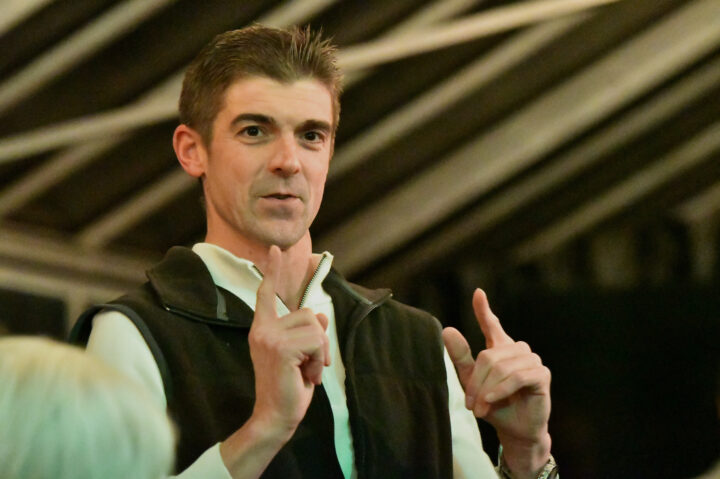
Marc Levy/AP
Ryan Crosswell, former federal prosecutor who quit the Department of Justice in protest, speaks at a campaign event for his run for Congress, Dec. 4, 2025, in Allentown, Pa.
Former federal prosecutor and Marine veteran Ryan Crosswell is hoping his military and professional background — as well as his past registration as a Republican — will provide a road map to winning the Democratic nomination and ultimately flipping a critical swing district in Pennsylvania.
The 7th Congressional District centered around Allentown and Easton and rated by the Cook Political Report as a toss-up is held by Rep. Ryan Mackenzie (R-PA), who himself flipped the seat in 2024. It was previously held by former Rep. Susan Wild (D-PA).
Crosswell, in an interview with Jewish Insider, characterized himself as a lifelong public servant and patriot, both as a Marine and as a federal prosecutor, who “always put my country first, even when it came at personal costs, as when I resigned from the Department of Justice because I felt I was being asked to do something that was inconsistent with my oath.”
Crosswell left the DOJ last February in protest of the Trump administration’s decision to drop corruption charges against former New York City Mayor Eric Adams.
He’s running for Congress because “this administration is dangerous,” and he wants to fight for affordability and safety for his constituents. He said his experience as an anti-corruption prosecutor makes him “uniquely suited to rebuild some of the guardrails that have been torn down.” He said that restoring those guardrails, including the public corruption section at the DOJ, is critical to having a “functioning democracy.”
Though he’s running in the Democratic primary, Crosswell was a registered Republican until after the 2024 election. But he said he’s voted consistently for Democratic presidential candidates since 2016.
“[We’re] at a point right now, there is one party that’s clearly on the right side of history, and one party is clearly on the wrong side of history,” Crosswell said.
Crosswell argued that he’s the best-placed candidate to flip Republican voters in November: He said a key takeaway from last year’s New Jersey and Virginia gubernatorial elections is that Democratic veterans are attractive candidates. He added that his background as a former Republican will help him connect with independent and GOP voters to “explain that the Republican Party is not what it once was.”
He also said that his experience as a veteran and federal prosecutor addressing a series of sensitive and high-profile issues makes him best prepared to address a range of subjects as a member of Congress in what he predicted “will be the most challenged Congress in American history.”
Croswell said that he’s “uncomfortable with cutting off aid” to Israel, as some in the Democratic Party are advocating for, “because Israel is surrounded by historical enemies and I don’t want to put the Israeli people in danger by cutting off aid.”
Crosswell is facing off against a series of other more liberal candidates in the primary, most notably Bob Brooks, the leader of the firefighters’ union who was endorsed by Gov. Josh Shapiro last month. Though Crosswell led among Democrats in fundraising as of the end of September, Shapiro’s endorsement and a fundraiser the popular governor held for Brooks last month are expected to help Brooks close the gap.
Crosswell described Israel as “an important ally to the United States” and the “only true democracy in the Middle East.” He visited Israel and the West Bank shortly before the Oct. 7, 2023, Hamas terror attacks. He said that he was “just so impressed by the Israeli people, their innovation and technology,” and their resilience in the face of both inhospitable environmental conditions and the enmity of surrounding nations.”
He said that he’s “uncomfortable with cutting off aid” to Israel, as some in the Democratic Party are advocating for, “because Israel is surrounded by historical enemies and I don’t want to put the Israeli people in danger by cutting off aid.”
He added that “no country is ever entitled to unconditional military aid from the United States under any circumstances, but I’m not willing to cut off aid now.”
Crosswell emphasized the need for the ceasefire in Gaza to continue, adding that those responsible for the Oct. 7 attack should be held accountable “through surgical special forces operations with a ceasefire in place.”
Asked about the U.S. strikes on Iran last summer, Crosswell said he’s “uncomfortable with direct military engagement in Iran at this time,” while adding that Israel must make its own decisions about “what the Israelis believe is necessary in their own interest.” Crosswell spoke to JI prior to the wave of public protests in Iran, which have led the Trump administration to contemplate renewed U.S. attacks.
“I would prefer to avoid U.S. engagement until it’s absolutely necessary,” he continued.
He said that, from his conversations in Israel and the West Bank during his visit, he believes both sides want peace, and emphasized the importance of continuing to pursue a two-state solution.
“It’s been frustratingly hard getting there, but it is the only solution and we can’t give up on it,” Crosswell said. “We need to demonstrate that we are advocates for peace, and that we’re advocating for both sides. We need to demonstrate that through our actions, that we’re committed to this, that we’re willing to have both sides at the table and to work through this, and we need to engage the other Arab nations.”
“I was a Justice Department prosecutor, and we have laws on the books to prosecute those who engage in hate crimes, and we should do that,” Crosswell said. “But I think also members of Congress — we need to be outspoken voices, and we need to speak out against it. And so I’d be in favor of any law that or any efforts to expand education on Jewish history, on the Holocaust, antisemitism, certainly any measures that can be taken to ensure the security of Jewish institutions and synagogues.”
He said that the U.S. should not, however, preempt direct negotiations between Israel and the Palestinians and recognize a Palestinian state. And he said that removing Hamas from leadership in Gaza is also a critical step to facilitate peace.
At home, Crosswell called the rise in domestic antisemitism “sickening” and said that it was “heartbreaking” to see armed guards outside a synagogue that he visited recently for an event.
“I was a Justice Department prosecutor, and we have laws on the books to prosecute those who engage in hate crimes, and we should do that,” Crosswell said. “But I think also members of Congress — we need to be outspoken voices, and we need to speak out against it. And so I’d be in favor of any law that or any efforts to expand education on Jewish history, on the Holocaust, antisemitism, certainly any measures that can be taken to ensure the security of Jewish institutions and synagogues.”
He added that, “more than anything else, it’s just being voices of moral clarity against hate against anybody, and in particular now, the antisemitic rhetoric and behavior that in some cases we’re seeing from both sides.”
The haul signals Ed Gallrein, who came into the race with President Trump’s endorsement, is emerging as a formidable opponent
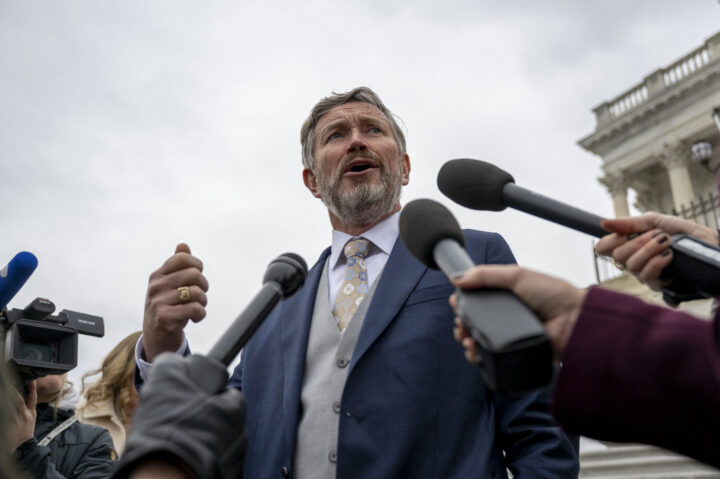
DANIEL HEUER/AFP via Getty Images
Rep. Thomas Massie (R-KY) speaks to reporters at the US Capitol on Washington, DC on November 18, 2025.
Ed Gallrein, the Republican primary challenger to Rep. Thomas Massie (R-KY) backed by President Donald Trump, said Friday that he had raised $1.2 million in the final quarter of 2025, a sizable sum that puts him in strong financial shape in preparation for a grueling race against Massie.
Gallrein’s fundraising haul signals that he’s a more viable candidate than Massie’s previous challengers, and highlights the power of Trump’s endorsement.
Trump and his allies have also committed significant resources to the effort to defeat Massie, an isolationist Republican who has frequently opposed legislation to combat antisemitism and has broken with Trump on many key elements of his agenda, including on issues related to Israel and Iran.
Gallrein’s campaign has also attracted interest from pro-Israel Republicans.
“This fundraising number reflects the overwhelming support Ed’s campaign has received right out of the gate,” Gallrein spokesperson Lance Trover said in a statement. “President Trump endorsed Ed because he knows Ed is fighting to put America First and will partner with him to unleash our economy, lower taxes, and stop the woke agenda.”
Massie, however, has also proven to be a strong fundraiser as he gears up for a reelection fight: he reported raising $1.8 million and having more than $2 million on hand as of the end of September.
Gallrein is a Kentucky native and former Navy SEAL.
The move by the prominent Republican, who gained attention for her grilling of university presidents amid federal inquiries into campus antisemitism, comes a month after she entered the race

Kent Nishimura/Getty Images
Rep. Elise Stefanik (R-NY) testifies before the Senate Foreign Relations Committee on her nomination to be Ambassador to the United Nations on Capitol Hill on January 21, 2025 in Washington, DC.
Rep. Elise Stefanik (R-NY) announced on Friday that she was ending her campaign for governor of New York, an abrupt and unexpected move that comes just over a month after the Republican congresswoman launched her bid to unseat Gov. Kathy Hochul.
In addition to not running for governor, Stefanik said in a statement posted to social media that she also would not seek reelection to her House seat, making her future plans unclear. Stefanik said the decision to end her short-lived gubernatorial bid was based on her desire to spend more time with family and the uphill battle she would face in the general election after what would likely be a bruising Republican primary battle.
“While spending precious time with my family this Christmas season, I have made the decision to suspend my campaign for Governor and will not seek re-election to Congress. I did not come to this decision lightly for our family,” Stefanik wrote on social media.
Stefanik added, “As we have seen in past elections, while we would have overwhelmingly won this primary, it is not an effective use of our time or your generous resources to spend the first half of next year in an unnecessary and protracted Republican primary, especially in a challenging state like New York.”
“And while many know me as Congresswoman, my most important title is Mom. I believe that being a parent is life’s greatest gift and greatest responsibility,” she continued. “I have thought deeply about this and I know that as a mother, I will feel profound regret if I don’t further focus on my young son’s safety, growth, and happiness — particularly at his tender age.”
Stefanik’s withdrawal from the race came weeks after Nassau County Executive Bruce Blakeman, another close ally of President Donald Trump, jumped into the GOP primary, setting up a competitive fight ahead of what would be a difficult general election contest for Republicans in the blue state.
Stefanik was briefly Trump’s nominee to be U.S. ambassador to the United Nations, though she withdrew her nomination as it became clear that House Speaker Mike Johnson (R-LA) could not afford another vacancy in the House without risking Republicans’ already slim majority.
Trump said in a statement on his Truth Social platform after Stefanik announced her decision, “Elise is a tremendous talent, regardless of what she does. … She will have GREAT success, and I am with her all the way!”
Johnson, meanwhile, wrote on X, “I know this was a tough decision for my friend and colleague @EliseStefanik, but her resolve to put family first is one that everyone will respect. Elise is an exceptional talent who has served the people of New York valiantly in Congress.”
“She will continue to be [a] leading force for our party and its principles no matter what the next chapter brings,” he added. “We are grateful for her service and wish her well in her next endeavors.”
The upstate New York lawmaker, a pro-Israel stalwart in Congress, had said during her confirmation process earlier this year that anti-Israel and antisemitic bias at the U.N. was a major factor that drove her interest in the Turtle Bay role. As she began considering entering the governor’s race this fall, Stefanik became a vocal critic of Hochul, frequently tying her to New York City Mayor-elect Zohran Mamdani and his policies.
Stefanik has gained attention in the Jewish community in the two years since Hamas’ Oct. 7, 2023 attack on Israel, most notably due to her aggressive questioning of university presidents about campus antisemitism.
Fishback has sought to cast next year’s Republican primary as 'very clearly a two-person race,' but political operatives are skeptical his bid will amount to on-the-ground traction even as he provokes controversy from behind the screen

Campaign website
James Fishback
In recent weeks, James Fishback, a 30-year-old Republican investor who last month launched a long-shot campaign for governor of Florida, has drawn online attention for a series of incendiary social media posts attacking Israel and invoking antisemitic tropes.
In addition to praising followers of the neo-Nazi influencer Nick Fuentes, comments for which he has refused to apologize, Fishback has promoted a range of extreme anti-Israel positions, including in a recent campaign ad vowing to defend those who accuse the Jewish state of genocide. He has taken repeated aim at the pro-Israel organization AIPAC, which he calls a “foreign lobbying group,” saying its supporters are “slaves” and that his own “allegiance is to America.”
“I’ll be the first to admit that I fell for the ‘Israel is our greatest ally’ scam and the lie that criticizing Israel is ‘antisemitic,’” he wrote in a social media post this week. “It wasn’t until I was offered a paid trip to Israel this summer (which I never took) that I realized how cringe and pathetic the propaganda was.”
In using such inflammatory rhetoric, Fishback, a political newcomer, is likely seeking to capitalize on the views of a younger audience of far-right voters increasingly fueling anti-Israel as well as antisemitic sentiment in the GOP, which has recently forced the party to confront a growing schism within its ranks over its ideological direction.
But while Fishback has sought to cast next year’s Republican primary as “very clearly a two-person race” between him and Rep. Byron Donalds (R-FL) — the pro-Israel GOP front-runner now dominating the polls while reporting a $40 million fundraising advantage — political operatives in both parties are skeptical his insurgent bid will ultimately amount to any sort of meaningful on-the-ground traction even as he continues to provoke controversy from behind the screen.
“Social media is the only reason anyone has heard of Fishback, and 20 years ago no one would even be talking about him,” Steve Schale, a Democratic strategist in Florida, told Jewish Insider. “Unless he stumbles into a pile of cash, it’s hard for me to see this being more than just an effort to get clicks.”
Fishback, the CEO of an anti-DEI investment firm called Azoria, is hardly the first candidate hoping to translate social media clout into votes or fame. A growing cohort of young influencers seeking office has emerged in recent years, so far with no success.
Deja Foxx, a progressive TikTok activist who ran for Congress in Arizona this summer, had raised a lot of money and appeared to be gaining momentum near the end of the campaign. But despite the hype, Foxx fell short by nearly 40 points — losing out to a more established local lawmaker.
In the race to succeed outgoing Florida Gov. Ron DeSantis, Donalds, a three-term congressman who is endorsed by President Donald Trump, is heavily favored to clinch the nomination over a handful of lesser-known primary rivals. Multiple surveys have shown him leading by double digits — with support from a range of state elected officials. Fishback, for his part, claimed just 2% of the vote in a recent poll.
“Although we’re still in the early stages of this race, it’s almost game, set, match,” said Ford O’Connell, a Republican strategist in Florida. “Byron Donalds is dominating the field, approaching 50% in the polls. Once voters realize he has Trump’s endorsement, he becomes the clear favorite. In GOP primary politics, Trump’s endorsement is the platinum standard.”
“If you look at any legitimate polling I would say Mr. Fishback has a very tall mountain to climb,” Will McKinley, a GOP lobbyist and government consultant in the state, echoed to JI.
Jim Cherry, a Republican pollster in Florida, said his “firm does political polling and as of this point, no client has requested that we include Fishback in any gubernatorial head-to-head questions.”
A college dropout and former hedge fund analyst, Fishback attracted some attention in conservative circles after he pitched DOGE “dividend checks” to a receptive Elon Musk, though the plan never took off. He later launched a super PAC to oppose Musk when the billionaire mogul fell out with Trump. He announced his gubernatorial bid in mid-November, pledging to “build on” DeSantis’ “historic record.”
Fishback has portrayed himself as a strong ally of DeSantis, who has so far declined to publicly back anyone in the race, while dismissing Donalds’ bid. But Fishback’s hostility to Israel puts him at odds with the governor, who has long touted his support for the Jewish state.
Meanwhile, Fishback’s recent comments on Israel are almost certain to alienate a sizable population of Jewish voters who live in Florida and can help tip the scales in close elections.
“In my opinion, he’s not a serious candidate and is simply trying to be incendiary to get attention,” said Gabriel Groisman, a Jewish Republican donor and a former mayor of Bal Harbour, Fla.
He declined to comment further, saying that doing so would be “counterproductive.”
In a statement to JI Thursday, Sam Markstein, spokesperson for the Republican Jewish Coalition, dismissed Fishback as “a radical fringe candidate who has decided that the way to run his campaign is to attack the Jewish community and our ally Israel.”
“It won’t work — and Republican Floridians will resoundingly reject him in the GOP primary,” he said.
Fishback, in response, said the “only poll that matters is on Election Day: August 18, 2026,” adding: “Until then, I am committed to earning Floridians’ votes by visiting all 67 counties to meet folks where they are, hear their concerns and share my vision for a more affordable Florida.”
“If elected, I’ll be a governor for all Floridians,” he continued in a statement to JI. “As a Christian, I have never ‘attacked’ anyone for their faith. I will protect religious freedom and ensure the safety of all Floridians.”
Sen. John Kennedy told JI that Barrack was ‘very incorrect’ when casting doubt on Israel’s status as a democracy
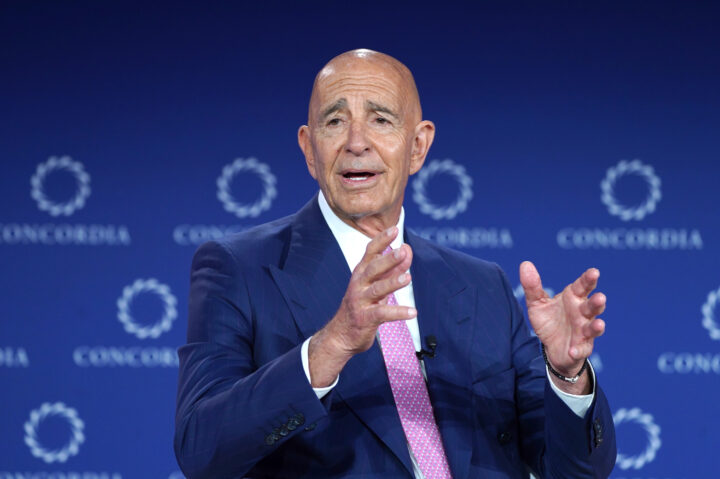
Leigh Vogel/Getty Images for Concordia Annual Summit
U.S. Ambassador to Turkey Tom Barrack speaks during the 2025 Concordia Annual Summit on September 24, 2025 in New York City.
Republican lawmakers are criticizing U.S. Ambassador to Turkey Tom Barrack over his recent comments questioning whether Israel is a democracy while voicing support for Turkey joining the proposed U.S.-led International Stabilization Force to operate in Gaza.
Barrack raised eyebrows with his comments on Sunday at the Doha Forum in Qatar — where the Syria envoy appeared to cast doubt on Israel’s status as a democracy while suggesting that “benevolent” monarchies were typically more successful in the region. Earlier last week, the ambassador drew attention for endorsing Turkey’s inclusion in the ISF because their “criticized relationship” with Hamas would “soften whatever has to be done” to disarm them.
Barrack’s comments in Doha were made in the context of criticizing previous efforts by the U.S. and others to impose democratic governing models in the Middle East. “Almost every decision that the West has imposed on the region, rather than allowing it to evolve on its own, has been a mistake,” Barrack said.
“The first thing that has to happen is that we have to allow them, Syria, to define it themselves without going in with Western expectations and saying, ‘We want a democracy in 12 nights,’” Barrack said on Sunday. “We’ve never had a democracy [in the Middle East]. I don’t see a democracy anywhere. Israel can claim that it’s a democracy, but in this region, really what has worked the best, whether you like it or don’t like it, is a benevolent monarchy.”
At the Milken Institute’s Middle East and Africa Summit in Abu Dhabi, United Arab Emirates, on Friday, Barrack said, “If you think about it, having Turkey, who has a relationship and an Islamic foothold, will soften whatever has to be done in this, disarming Hamas. … How are you going to disarm them? Are you really going to militarily disarm them? Are we going to be in the soup again? Do you have caches and say, show up at public storage, and we’ll give you a ticket, and this is going to go into the IDF?”
Sen. John Kennedy (R-LA) told JI that Barrack was “very incorrect” with his musing about Israel’s standing as a democracy. “I think Israel is a democracy, and Israel is our only true friend in the Middle East,” Kennedy said.
Asked for his reaction to Barrack’s public support for Turkey joining the ISF, the Louisiana senator replied: “I don’t trust Turkey.”
Sen. Lindsey Graham (R-SC) said about Barrack’s comments, “If I had to give you an example of a robust democracy, it would be Israel. If you don’t like the government, stick around a month, they’ll get a new one.”
Daniel Shapiro, who served as U.S. ambassador to Israel during the Obama administration and as deputy assistant secretary of defense for the Middle East for a year and a half of the Biden administration, told JI that Barrack’s comments about Israel’s democratic bona fides were “a bit chilling.”
“There’s no cause for calling into question Israel’s status as a democracy,” Shapiro said. “I’ll give him the benefit of the doubt that that was simply a misstatement that he probably will think better of.”
“I know it’s better when ambassador’s statements are fully aligned with the policies of their administration,” he continued. “This administration generally may be less coordinated in that regard than others because our president speaks so frequently and extemporaneously, but that actually raises the importance of ambassadors ensuring that they are fully aligned with whatever the president’s policy is.”
The remarks also prompted criticism from foreign policy analysts and experts, who suggested the ambassador to Ankara was acting more in the interests of Turkey than the United States.
“There’s no question that he often reflects the Turkish view on a number of things,” Michael Makovsky, president of the Jewish Institute for National Security of America, told JI. “That might be his view, or in my opinion, he doesn’t really understand the Middle East or proper U.S. interests in the Middle East. Generally, he often reflects Turkish views of the region.”
“That happens sometimes with ambassadors, they sometimes strongly reflect the views of the countries to which they’re posted, but he’s really been out there on this,” he continued. “Personally, that is concerning to me.”
Makovsky questioned Barrack’s broader approach to the media while criticizing his remarks about whether Israel is a democracy as “a bit incomprehensible.”
“I find that Barrack speaks a lot in public or to journalists, to the media. Frankly, a number of the statements he makes are kind of hard to understand, and certainly this is one of them,” he explained, describing Barrack’s previous statements to the media as “word salads.”
Sinan Ciddi, a senior fellow at the Foundation for Defense of Democracies, similarly voiced concerns about Barrack’s warm stance toward the Turkish government.
“He’s made it no secret that he is essentially very pro-Turkey, and that he sympathizes [with the view that] the key to stability or [achieving] U.S. interests goes through projecting Turkish interests in the region,” Ciddi told JI. “For a long time [he has been] suggesting that if there is going to be lasting peace and essentially a cessation of hostilities inside of Gaza, then Turkey has to play a role, which means putting Turkish troops inside of Gaza as part of the stabilization force.”
“Obviously, Israel has a problem with that,” he added. “Not only Israel, but also significant parts of the U.S. government and a handful of Arab states, because they feel that a Turkish presence there would unsettle the balance there because of Turkey’s ties to Hamas.”
Ciddi noted that the United Arab Emirates, Saudi Arabia and Egypt have all voiced concerns about what type of involvement Ankara would have in the ISF. He added that Turkish President Recep Tayyip Erdogan sees the ISF “as a momentous opportunity to step into Gaza and undermine Israel and really project Turkey’s power.”
The Arab states are “deeply worried that Turkey’s military presence there would be to basically prop up Hamas. They’re not going to be there to essentially disarm and dissolve Hamas, that Turkey is basically going to stand shoulder to shoulder [with Hamas],” Ciddi told JI. “That’s going to just basically heighten tensions between Turkey and Israel and could lead to the potential of an arms conflict between them. Nobody wants that. Nobody understands why Barrack is pushing for that.”
“Either Tom Barrack is ignorant of the facts pertaining to Turkey’s deep enmeshment and involvement with Hamas over the years, particularly since Oct. 7 in terms of the material support it has provided Hamas … or he is choosing to ignore that,” he continued. “I think he’s either coming at it from a perspective of ignorance, or he’s choosing to ignore it. But neither bodes well, and that is the unfortunate circumstance.”
Ciddi also accused Barrack of “essentially running a portfolio where he feels very emboldened as ambassador to Ankara, as well as special envoy to Syria,” citing that he “doesn’t come from a traditional diplomacy or foreign service background. He knows he has the ear of [President Donald] Trump. He knows he’s one of the few people that Trump listens to.”
Barrack faced backlash from Israel on Tuesday for his recent comments, with Walla News reporting that Israeli Prime Minister Benjamin Netanyahu and his team view Barrack as too closely aligned with Turkey.
“Barrack is acting like a Turkish ambassador and undermining regional stability,” a senior Israeli official told the outlet, adding that Barrack is “overly influenced by Turkish interests in Syria” and is operating “to a significant extent in line with Syrian interests.”
An Israeli diplomatic source confirmed the Walla report, adding that they were “stunned by [Barrack’s] statements praising benevolent monarchies and belittling Israeli democracy,” and saying that the remarks were unprecedented.
The White House did not respond to JI’s request for comment.
Lahav Harkov contributed to this report.
Greene has a history of promoting antisemitic conspiracy theories, including on the campaign trail

Marjorie Greene (Greene for Congress)
Controversial congressional candidate Marjorie Taylor Greene appears to be headed for Washington following her victory on Tuesday in the Republican runoff in Georgia’s 14th congressional district. Her win raises concerns among Jewish organizations who have sounded the alarm over her candidacy for months. The district’s overwhelmingly Republican make-up all but ensures that Greene will win the general election in November.
Greene has been a vocal promoter of the QAnon conspiracy theory — which alleges that President Donald Trump is working to take down a network of Democratic politicians and celebrities who practice satanism, pedophilia and cannibalism — and has posted Facebook videos expressing antisemitic, racist and Islamophobic views.
Even after launching her campaign, Greene continued to unapologetically propagate antisemitic conspiracy theories, including falsely accusing Democratic megadonor and Holocaust survivor George Soros of “turning people over to Nazis where they were burned in offices” in a recent television interview. She also dismissed questions about a photo she took with a former Ku Klux Klan leader who described her as a “friend.”
“Ms. Greene has a history of propagating antisemitic disinformation,” Allison Padilla-Goodman, Southern division vice president of the Anti-Defamation League, said in a statement to Jewish Insider. “ADL previously called on Ms. Greene to disavow her relationship with a prominent white supremacist leader and retract past antisemitic statements. ADL said that ‘failure to do so is a moral failure and unbecoming of someone seeking elected office.’ Ms. Greene’s continued insistence on propagating such antisemitism shows she has decided to double down on hate, which, to say the least, is deeply problematic.”
Republican leaders spoke out against Greene after her Facebook videos surfaced, but only House Minority Whip Steve Scalise (R-LA) actively worked to boost her opponent, physician John Cowan, frustrating some House Republicans, according to Politico. Scalise, House Minority Leader Kevin McCarthy (R-CA) and the National Republican Campaign Committee did not respond to requests for comment.
The Republican Jewish Coalition opposed Greene during the runoff and endorsed Cowan.
“We are really proud to have endorsed John Cowan. We do not endorse Greene and we think she is the antithesis of what our party stands for,” RJC communications director Neil Strauss said in a statement to JI. “We can hold our heads up high tonight for standing up to Greene, just like we did when we stood up to [Rep.] Steve King by supporting Randy Feenstra.”
Rabbi Abraham Cooper, associate dean of the Simon Wiesenthal Center, said he was hopeful that Republican leaders would continue to distance themselves from Greene.
“During the primary campaign, top national Republican leaders in Congress, led by the House Minority Leader, denounced her bigotry with good reason. Some even endorsed her opponent. Yet she will likely be elected to Congress this fall,” Cooper said in a statement to JI.
Cooper called on Republican leaders to marginalize Greene within the Republican caucus as they did with King after he questioned why white supremacy was considered offensive.
“If Ms. Green[e] doesn’t change course,” Cooper said, GOP leaders “may have to apply [the] same standards to her.”
In Georgia’s deep red 9th district, State Rep. Matt Gurtler, who also refused to apologize for taking a photo with the same former KKK leader, lost his runoff race against gun store owner and Navy veteran Andrew Clyde.












